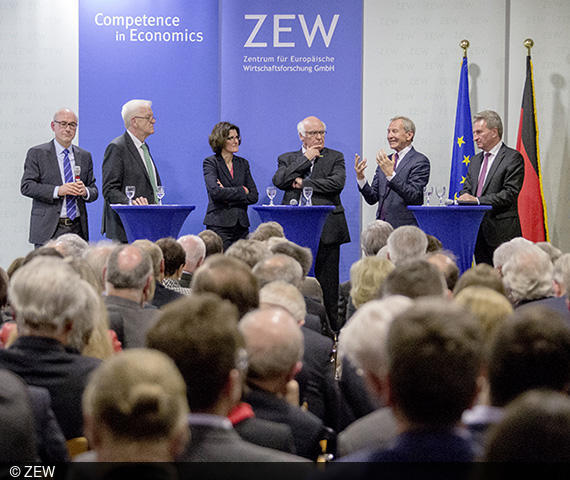Education as the Key to Digitalisation – An Event in Memory of Lothar Späth
EventsHow can politics and economics keep up with the rapid pace of digitalisation? In what ways is Lothar Späth's pioneering approach to digitalisation still applicable today? The opportunities and challenges this rapid change poses for companies, institutions and society as a whole served as the focus of a podium discussion held in memory of Professor Lothar Späth, former Minister President of Baden-Württemberg and a key figure in the founding of the Centre for European Economic Research (ZEW), on 21 March 2017.
Späth was a pioneer in terms of paving the way for technological change both politically and economically. In honour of his visionary ideas, a debate was held involving Winfried Kretschmann, current Minister President of Baden-Württemberg, Günther H. Oettinger, EU Commissioner for Budget and Human Resources, Dr. Herbert Henzler, former head of the management consultancy firm McKinsey in Germany, Dr. hon. Martin Herrenknecht, CEO of Herrenknecht AG, and Professor Irene Bertschek, head of the ZEW Research Department "Information and Communication Technologies". The debate was moderated by ZEW President Professor Achim Wambach.
To kick off the debate, the ZEW President asked the panel for their assessment of the progress of digitalisation in firms based in Baden-Württemberg. Minister President Kretschmann's response was a call for greater digital integration within firms. "Baden-Württemberg's small and medium-sized enterprises in particular need to make the leap towards a digital work environment," said Kretschmann. Firms are to be supported in this process through government projects such as "Wirtschaft 4.0". Irene Bertschek pointed out that small and medium-sized enterprises were lagging well behind larger companies, who are seen as the early adopters of new technology. ZEW studies have shown that there are three main factors than hamper the progress of digitalisation in firms."Concerns about data security and data protection, insufficient broadband speed and a lack of IT skills are the main factors that need to be addressed," Bertschek suggested.
Small to medium-sized enterprises are at a digital disadvantage
EU Commissioner Oettinger agreed that these smaller firms had some catching up to do and recommended looking to transatlantic firms as a guiding example. The biggest European company in a recent ranking of leading global internet giants only came in at number 51. "We need an integrated solution for small and medium-sized enterprises in order to be able to compete regionally and on the European level. We also need to harmonise standards within the European Single Market," said Oettinger. Martin Herrenknecht also agreed that, just as Späth used to encourage Baden-Württemberg-based firms to become more international, today's companies need to keep up with digitalisation on a global level. "Lothar Späth encouraged growth and created the exact and essential conditions for such growth to occur."
Very much in keeping with Späth's own ideology, Herbert Henzler called for greater engagement from politicians and economists. "I would say that we're at the point of falling behind and just being inundated with vast quantities of data," said Henzler, "We have to bridge this gap with a view to the future so that we don't get caught off guard by new innovations. The key to making a digital comeback is education." Henzler then called for stronger links between specialists across Europe and a transition towards digital knowledge platforms.
"We must encourage digitalisation across all disciplines"
Both Minister President Kretschmann and EU Commissioner Oettinger advocated for the founding and greater financing of research alliances. "Baden-Württemberg-based research alliances have got to become attractive hotspots. At the same time there has to be a discernible technology transfer between research and business," said Kretschmann. Another problem, according to Oettinger, is the still rather small number of IT specialists working in Baden-Württemberg companies. "We need to integrate digitalisation into society, starting with schools and families right up to universities and businesses," the EU Commissioner explained.
Herrenknecht countered this, claiming that businesses and researchers were already working closely with one another. "We don't just need specialists in IT, but in all disciplines. We can no longer completely separate the digital world from the real one." ZEW Research Department head Irene Bertshek concluded by pointing out that companies saw a particular need for further IT training in the area of data security. "But we still need to encourage further training across all disciplines. Only knowledge networking can advance digitalisation in Europe."
